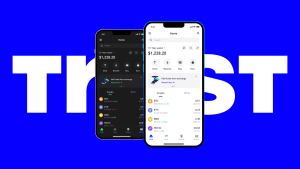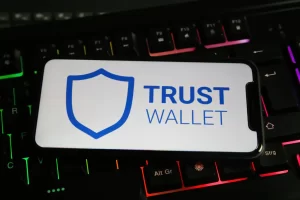Does Trust Wallet charge any fees?
Trust Wallet does not charge any fees for storing, receiving, or sending cryptocurrencies. However, network fees (also known as gas fees) are required for transactions and are paid to the blockchain network. These fees depend on the cryptocurrency and blockchain being used.

Understanding Trust Wallet’s Fee Structure
Does Trust Wallet Charge for Transactions?
-
No Transaction Fees by Trust Wallet: Trust Wallet does not charge any internal fees for sending, receiving, or storing cryptocurrencies. You only pay the necessary network fees, which are required by the blockchain.
-
Trust Wallet as a Non-Custodial Wallet: Since Trust Wallet is a non-custodial wallet, it does not impose any fees for wallet creation or asset management, ensuring that users maintain full control of their funds.
-
Fees Determined by Blockchain Networks: Trust Wallet operates solely as a tool for managing crypto assets. Transaction fees depend on the blockchain network you are using, such as Ethereum or Binance Smart Chain, and not the wallet itself.
How Network Fees Work in Trust Wallet
-
Network Fees for Transactions: When you send or receive crypto, the blockchain network charges a transaction fee. These fees are paid to miners or validators who process the transactions on the respective blockchain.
-
Gas Fees for Ethereum and Similar Blockchains: For Ethereum-based assets, gas fees are used to prioritize and execute transactions. These fees can fluctuate depending on network demand and transaction complexity.
-
Trust Wallet’s Fee Display: Before confirming a transaction, Trust Wallet shows you the estimated network fee, allowing you to adjust the fee settings (if applicable) or wait for lower congestion before sending your transaction.
Types of Fees When Using Trust Wallet
Transaction Fees for Sending and Receiving Crypto
-
Blockchain Network Fees: Trust Wallet does not charge any transaction fees itself. However, when you send or receive cryptocurrency, you must pay a network fee. These fees are determined by the blockchain network and are paid to the validators or miners who confirm and process the transaction.
-
Gas Fees on Ethereum and Similar Networks: For cryptocurrencies on networks like Ethereum, gas fees are required. These fees fluctuate based on network congestion and the complexity of the transaction. Gas fees are usually higher during peak times.
-
Flat Fees on Some Networks: Other blockchains, such as Binance Smart Chain (BSC), have lower and more predictable transaction fees compared to Ethereum. This makes transactions on BSC generally cheaper for users.
How Trust Wallet Handles Network Fees for Different Cryptocurrencies
-
Automatic Fee Calculation: When you initiate a transaction, Trust Wallet automatically calculates the appropriate network fee based on the selected cryptocurrency and network. For example, if you’re sending Bitcoin, it will display the Bitcoin network fee, while Ethereum transactions will show the corresponding gas fees.
-
User Control Over Fees: Trust Wallet allows you to adjust network fees in some cases, such as for Ethereum transactions. You can choose a higher fee for faster processing or a lower fee for slower confirmation, giving you control over the cost and speed of your transaction.
-
Dynamic Fee Adjustments: Trust Wallet dynamically updates network fees in real-time, depending on the current network conditions, ensuring users are always informed about the fees they will incur before confirming a transaction.

Why Trust Wallet Does Not Charge Any Extra Fees
Trust Wallet’s Policy on Fees
-
Non-Custodial Wallet Model: Trust Wallet operates as a non-custodial wallet, meaning it doesn’t hold user funds or manage transactions. Because of this, it doesn’t need to charge any additional fees beyond the blockchain network fees, ensuring users have full control over their crypto.
-
User-Focused Experience: Trust Wallet’s goal is to provide users with a straightforward, secure platform for managing crypto. By not charging extra fees, it allows users to keep more of their funds without worrying about hidden costs or additional charges.
-
Transparent Fee Structure: Trust Wallet only shows the necessary network fees during transactions, which are required by the blockchain. There are no extra charges from Trust Wallet for sending or receiving crypto, promoting transparency and simplicity.
How Trust Wallet Maintains Low Fees for Users
-
No Transaction Fees from Trust Wallet: Trust Wallet doesn’t charge any fees for transactions, wallet creation, or token storage. This means the only fees users encounter are the network fees required by the blockchain.
-
Choice of Low-Cost Blockchains: Trust Wallet supports a variety of blockchains with lower transaction fees, such as Binance Smart Chain (BSC) and Tron. These networks offer users a cost-effective alternative to higher-fee networks like Ethereum, making it cheaper to send and receive crypto.
-
Optimized Fee Calculations: Trust Wallet displays estimated network fees based on current market conditions, giving users the flexibility to adjust fees for faster transactions or save on costs when network congestion is low. This flexibility helps users save on transaction costs.

How to Manage Network Fees in Trust Wallet
What Affects the Cost of Network Fees in Trust Wallet
-
Blockchain Network Congestion: The primary factor affecting network fees is congestion on the blockchain. During periods of high demand, such as when there are many transactions or dApp activities, fees tend to increase.
-
Transaction Complexity: More complex transactions, such as those involving smart contracts or multiple tokens, may require higher fees due to the extra computational work required by the blockchain.
-
Type of Cryptocurrency: Different blockchains have different fee structures. For example, Ethereum typically has higher gas fees due to network congestion, while Binance Smart Chain (BSC) offers lower transaction fees, making it more cost-effective for users.
Tips for Reducing Gas Fees on Trust Wallet
-
Choose Low-Cost Blockchains: If possible, use blockchains with lower fees, like Binance Smart Chain (BSC) or Tron, instead of Ethereum. These blockchains offer similar functionalities with much lower transaction costs.
-
Adjust Transaction Speed: Trust Wallet allows users to adjust the network fee before confirming a transaction. Opting for slower processing speeds can lower your transaction costs, as it allows you to pay a lower fee for a delayed confirmation.
-
Wait for Off-Peak Times: Gas fees on Ethereum and other busy networks tend to be lower during off-peak hours when there is less congestion. Plan your transactions during these times to save on costs.

Trust Wallet vs Other Wallets on Transaction Fees
How Trust Wallet Compares with Other Wallets Regarding Fees
-
No Additional Fees from Trust Wallet: Trust Wallet does not charge any extra fees for sending, receiving, or storing cryptocurrency. The only costs involved are the network fees imposed by the blockchain, which are the same for all wallets.
-
Lower Fees on Specific Blockchains: When using Trust Wallet, users can choose to transact on blockchains with lower fees, such as Binance Smart Chain (BSC) or Tron. In comparison, wallets like MetaMask may push higher fees due to Ethereum’s congestion.
-
Transparent Fee Structure: Trust Wallet provides clear visibility of network fees before confirming a transaction. In comparison, other wallets may have hidden fees or complicated fee structures, making Trust Wallet a more straightforward option for users.
Is Trust Wallet More Cost-Effective Than Centralized Exchanges?
-
Lower Transaction Fees: Unlike centralized exchanges, Trust Wallet doesn’t charge withdrawal or transaction fees. You only pay the necessary blockchain network fees. Centralized exchanges, on the other hand, often charge extra fees for withdrawals, especially when transferring funds to external wallets.
-
No Exchange Spreads: Centralized exchanges typically add a spread or margin on trades, leading to slightly higher costs for users. Trust Wallet allows you to directly interact with the blockchain, ensuring you avoid these additional costs.
-
Control Over Fees: With Trust Wallet, users have more control over their transaction fees. In comparison, centralized exchanges may apply their own fee structure, which can be less flexible and more expensive for users, especially during high network congestion periods.





